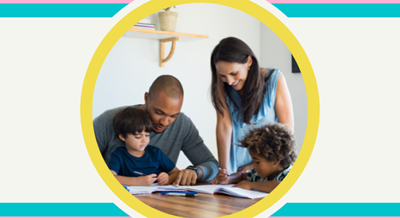
How can parents become more emotionally resilient to best nurture their lifelong commitment to their children?
Clincal psychologist and Chief Executive Officer of St Patrick's Mental Health Services (SPMHS), Paul Gilligan, celebrates and reflects on parental emotional resilience.
And then one day you realise that your children are worrying about you. You wonder how you let your guard down. It dawns on you that your well-being is their well-being, that they love you as much as you love them.
The United Nations (UN) recognises that, for the “full harmonious development of their personality, children should grow up in a family environment and in an atmosphere of happiness, love and understanding.” This is a powerful message.
For parents, this message provides an opportunity both to celebrate and to reflect. Becoming a parent changes your life forever. You think about your children every day. There is never a time when you are free from their influence. Your life is never your own again, and it is fantastic. You wonder how you ever lived without them. There is immense happiness, joy, and love.
Parenting also involves substantial worry, hurt, and loss. We worry about our children and for them. We feel their emotional pain and want to protect them from all that is bad in the world. Expectations on children and young people are immense and, as a result, child and parent anxiety levels have never been higher. Balancing work, social and parenting life is a challenge.
Emotional resilience is central to parenting. Being able to balance the stresses, losses and risks, while staying focused on happiness and love, is essential. The better our ability to do this, the better our child’s ability will be to do the same.
Building parental emotional resilience involves connecting with our “inner parent”, that part of us where our natural love for our child meets our natural ability to parent.
Essential to this is investing in our parental self-awareness; that is, knowing and understanding ourselves as parents, within the context of remembering that parenting is a journey of discovery, through which we learn more about our child every day.
Accepting and celebrating the uniqueness of our child and loving them unconditionally is also crucial. Central to our emotional resilience as parents is knowing how to be happy and knowing how to feel good about ourselves. It goes without saying that parental emotional resilience cannot thrive unless the environment we are parenting in is a safe and secure one.
The work required to build resilience benefits both us and our children.
Raising children to be emotionally healthy and resilient is one of the most important tasks we will undertake. With emotional health, our child stands the best chance of making the most of their childhood and of growing to be a productive and happy adult. They will be the parent who is most likely to raise emotionally healthy children of their own.
Modern parenting involves resolving the many myths and the accompanying self-destructive emotions that we are confronted with on an almost daily basis. Many of us feel we don’t spend enough time with our children, yet facts indicate that this generation of parents spend more quality time with their children than their parents and grandparents before them.
At times, we feel an overwhelming sense of protectiveness towards our children, a feeling reinforced by a barrage of messages abut the dangers facing them, such as drug usage, alcohol abuse and social media. Yet our children are probably safer than we, or our parents, were as children. Good parenting is associated with having academically successful and socially popular children, yet contentment for our children usually comes from them being enabled to “be themselves”.
Worry and guilt dominate many parents’ lives, feelings which not only impact on mental health, but can also impact on parenting style and decisions. These feelings can reflect in children who often soak up this angst and transfer it into anxiety and discontentment.
For many, the UN is irrelevant, but, perhaps, today it is useful to reflect on the three age-old and basic principles of good parenting:
- happiness
- love
- understanding.
Applying these helps us stay emotionally healthy and build our child’s emotional health and resilience and, in truth, makes for a better life.
Continue to…
Irish students become mental health ambassadors

